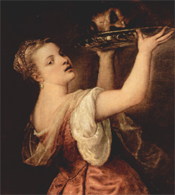
20 Oct 2008
STRAUSS: Salome — Covent Garden 2008
Salome, Musikdrama in one act.
Mozart and Salieri, an opera in one act consisting of two scenes.
Nicolai Rimsky-Korsakov (1844-1908), composer. Libretto derived from Alexander Puskhin's play of the same name.
First performance: 7 December 1898 in Moscow.
Ariadne auf Naxos, Oper with a prologue and one act. Music composed by Richard Strauss. Libretto by Hugo von Hofmannsthal.
La Vestale, a tragédie lyrique in three acts.
Boris Godunov, an opera in four acts with prologue
Modest Mussorgsky, composer. Libretto by the composer, based on Alexander Pushkin's drama Boris Godunov and Nikolai Karamazin's History of the Russian Empire
First performance: 8 February 1874 at the Mariinsky Theatre, St. Petersburg
Il Trovatore, dramma in four parts.
Only a few months following the premiere of Der Rosenkavalier, Hugo von Hofmannsthal proposed a new opera to Richard Strauss based on Molière’s comedy-ballet, Le Bourgeois gentilhomme (in German, Der Bürger als Edelmann).
Die Entführung aus dem Serail, Singspiel in 3 Acts.
Music composed by Wolfgang Amadeus Mozart (1756–1791). Libretto by Johann Gottlieb Stephanie the Younger, based on an earlier libretto by
Christoph Friedrich Bretzner.
Die Entführung aus dem Serail, Singspiel in 3 Acts.
Music composed by Wolfgang Amadeus Mozart (1756–1791). Libretto by Johann Gottlieb Stephanie the Younger, based on an earlier libretto by
Christoph Friedrich Bretzner.
Arabella: Lyrische Komödie in three acts
Die Entführung aus dem Serail, Singspiel in 3 Acts.
Music composed by Wolfgang Amadeus Mozart (1756–1791). Libretto by Johann Gottlieb Stephanie the Younger, based on an earlier libretto by
Christoph Friedrich Bretzner.
La Gioconda, dramma lirico in four acts.
Music composed by Amilcare Ponchielli (1834–1886). Libretto by Arrigo Boito (under the pseudonym Tobia Gorrio), based upon Victor Hugo's Angelo, Tyrant of Padua (1835).
Don Carlo, an opera in four acts. Music composed by Giuseppe Verdi (1813–1901). Libretto by Joseph Méry and Camille Du Locle after Friedrich von Schiller’s dramatic poem Don Carlos, Infant von Spanien. Revised version in four acts (French text revised by Du Locle, Italian translation by Achille de Lauzières and Angelo Zanardini).
Un ballo in maschera, a melodramma in three acts.
Music composed by Giuseppe Verdi. Libretto by Antonio Somma, based upon the work of Eugène Scribe Gustave III ou Le bal masqué (1833)
Medea: Melodramma tragico in three acts.
Die Tote Stadt, an opera in three acts.
Music composed by Erich Wolfgang Korngold (1897-1957). Libretto by Paul Schott (Julius and E. W. Korngold) after the novel Bruges la morte by Georges Rodenbach.
Manon Lescaut, dramma lirico in quattro atti
Elektra: Tragedy in one act.
Una cosa rara, ossia Bellezza ed onestà. Dramma giocoso in two acts.
Music composed by Vicente Martín y Soler (1754–1806). Libretto by Lorenzo Da Ponte from the comedy La luna de la Sierra by Luis Vélez de Guevara.
Hamlet: Opéra in five acts. Music composed by Ambroise Thomas. Libretto by Michel Carré and Jules Barbier after The Tragedy of Hamlet, Prince of Denmark by William Shakespeare.
Das Liebesverbot: Grosse komische Oper in two acts.

Salome, Musikdrama in one act.
Streaming Audio
Music composed by Richard Strauss. Libretto by the composer based on Hedwig Lachmann’s German translation of Oscar Wilde’s play
First Performance: 9 December 1905, Hofoper, Dresden
| Principal Characters: | |
| Herodes, Tetrach of Judea | Tenor |
| Herodias, wife of the Tetrach | Mezzo-Soprano |
| Salome, daughter of Herodias | Soprano |
| Jochanaan, a prophet | Baritone |
| Narraboth, a young Syrian | Tenor |
| A Page | Alto |
| 5 Jews | 4 Tenors, 1 Bass |
| 2 Nazarenes | Tenor, Bass |
| 2 Soldiers | Basses |
| A Cappadocian | Bass |
| A Slave | Silent Role |
Setting: Palace of Herod at Tiberias, Galilee, c. 30 C.E.
Synopsis:
Narraboth, the Captain of Herod’s guard, is fascinated by the princess Salome’s beauty. When she enters onto the palace terrace the voice of the prophet Jokanaan is heard from the cistern where he is imprisoned. She orders him to be raised up and Narraboth eventually surrenders to her will and disobeys Herod’s decree. Jokanaan emerges into the moonlight and denounces the incestuous union of Herod and Salome’s mother Herodias and demands that Salome repents and follows Christ. Equally apalled and mesmerised she is increasingly overcome by desire, praising his body, hair and mouth. Narraboth is distraught and kills himself, but Salome steps over his body in pursuit of her passion. Jokanaan curses her and returns to his prison. Herod emerges from the palace with Herodias, seeking Salome who ignores his advances. Stepping in Narraboth’s blood — a bad omen — he seeks relief from his nightmare visions. The voice of Jokanaan is heard again and Herodias demands that he be delivered to the Jews, provoking a religious debate about the true nature of the prophet and of Christ himself. Herod’s attention is solely focused on Salome who he begs to dance for him and swears an oath to grant her any wish. She performs the Dance of the Seven Veils and tells the horrified Herod that her payment will be the head of the prophet. She waits nervously at the edge of the cistern until the executioner delivers her prize on a silver platter. She ecstatically kisses Jokanaan’s lips, achieving fulfilment at last. In disgust, Herod orders her death.